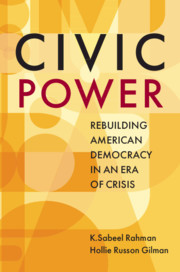Part III - Conclusion
Published online by Cambridge University Press: 09 August 2019
Summary
In the summer of 2017, a coalition of neo-Nazi and white supremacist groups held a “Unite the Right” rally in Charlottesville, Virginia, leading to counterprotest and clashes. One white supremacist, James Alex Fields Jr., drove a car into a crowd of counterprotesters, killing Heather Heyer and injuring several others. The stark images of an unvarnished, unrepentant, and seemingly unshackled neo-Nazi far right encapsulated the sense of democratic crisis under the specter of exclusionary populist movements for many who diagnose this as the main feature of the Trump era. At the same time, this is not the only “crisis” facing the ideals of American democracy. Concerns about rampant inequality, stagnant wages, the future of work, and the collapse of the safety net have threatened the “American Dream” of economic opportunity for many. Corporate power too seems on the ascent, from the increasing corporate influence on elections after the loosening of campaign finance regulations to corporate pressure on state legislatures and the growing merger wave creating mega-firms that dominate their markets.
- Type
- Chapter
- Information
- Civic PowerRebuilding American Democracy in an Era of Crisis, pp. 203 - 223Publisher: Cambridge University PressPrint publication year: 2019

